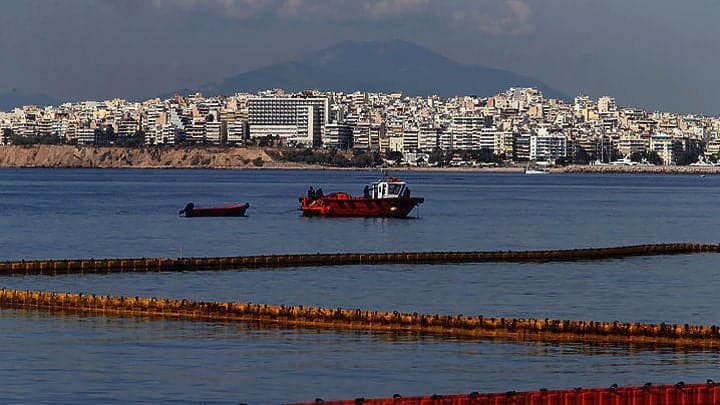

A Greek court has ruled that the 2017 sinking of an oil tanker near Athens that resulted in one of Greece’s worst environmental disasters in recent history, was an intentional act intended for financial gain.
The Piraeus Jury Court found that the three defendants -the captain, the owner of the tanker, Agia Zoni II, and the legal representative of the ship- were guilty of multiple environmental crimes, including the deliberate sinking of a vessel, discharge of polluting substances and causing environmental damage for profit. It handed them sentences of 12 years in prison, along with multiple fines. All three defendants have appealed.
According to the court’s findings, the aging tanker, built in 1972, sank under suspicious circumstances in the early hours of September 10, 2017. Before it sank, crew members had deliberately opened the valves and cargo tank hatches, creating an asymmetrical list that led to its flooding and eventual sinking. The tanker had been filled with nearly 2,200 metric tons of fuel, of which an estimated 500-700 tones were leaked into the sea, just off Salamina island in the Saronic Gulf and polluting more than 20 kilometers of coastline. Cleanup efforts cost millions and dozens of claims remain unresolved.
The motive, according to the court, was to claim compensation from the International Oil Pollution Compensation Fund (IOPC) and insurance providers.
The trial began in October 2024, seven years after the incident. During the trial, new technical evidence suggested that structural damage consistent with explosive force may have contributed to the tanker’s sinking. Previously, maritime accident authorities had attributed the sinking to human negligence and poor safety practices.
In September 2017, WWF Greece filed a criminal complaint while at the same time submitted to prosecutors an analysis of satellite images of the evolution of the oil spill, “so that the issue is not forgotten and the case is not covered up.”
Following the ruling, WWF Greece said in a statement that the verdict “…is a vindication of the ongoing struggle for the protection of nature.”

In a gigantic operation, Greek authorities had been scrambling for weeks to clean up the fuel leaked by Agia Zoni II, with strong winds sweeping away large chunks of oil slick and putting popular beaches around the Greek capital off limits to swimmers.
Five large anti-pollution vessels remained in the area for days, and were struggling to tackle the oil slick while authorities had also been setting up floating dams.
A week into the incident, despite the government’s announcement that at least 800 tons of heavy fuel oil had been pumped, local authorities said that as soon as one cleaning operation was completed, a new oil spill appeared and covered the coast anew.
Authorities had cordoned off many of the beaches in the southern suburbs of Athens that were heavily polluted, including those in the popular coastal resort of Glyfada.
Meanwhile, the Archipelago Institute of Marine Conservation had published images of the seabed near Salamis Island where the Agia Zoni II sank, showing that the oil stuck in the bottom of the sea ha turned into large, compact pieces. Archipelago said that the damage to the ecosystem was immeasurable.
